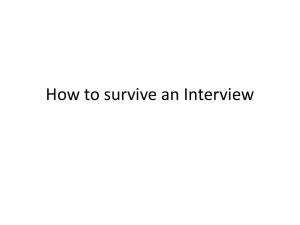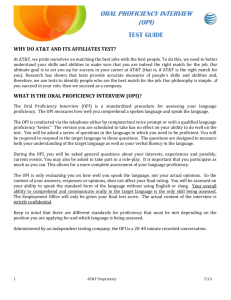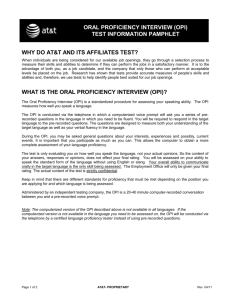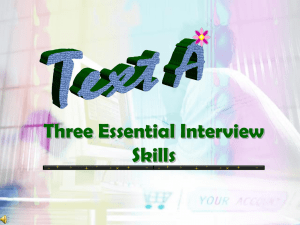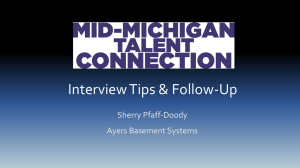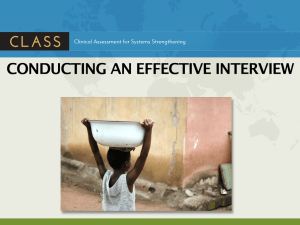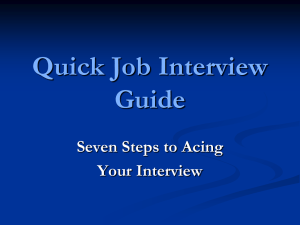OPI-workshop-rev-2013
advertisement
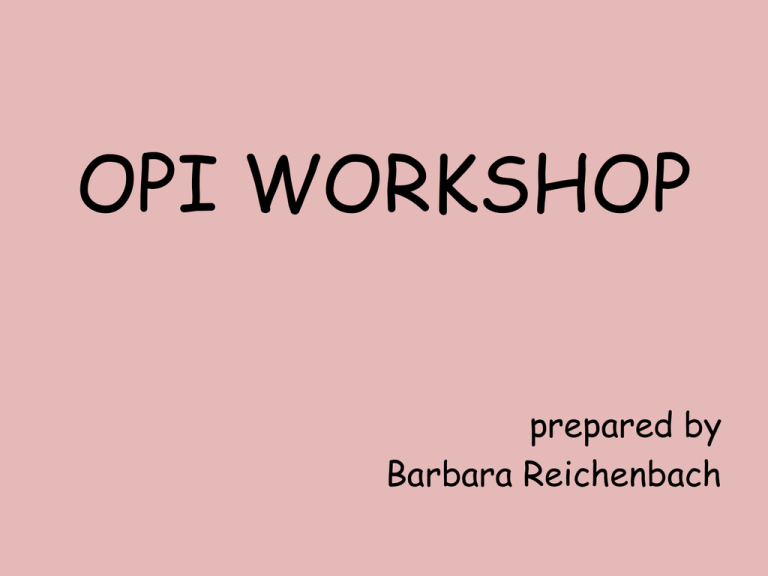
OPI WORKSHOP prepared by Barbara Reichenbach Check out this website: http://aboutworldlanguages.com/speaking-selfassessment ORAL PROFICIENCY INTERVIEWS • The OPI takes the form of a carefully structured conversation between a trained and certified interviewer (ACTFL) and the person whose speaking proficiency is being assessed (the candidate). A ratable speech sample is elicited from the interviewee by a series of questions or tasks, which follow the established protocol. The speech sample is recorded and later independently rated by two certified testers. Overview of Each Level of Oral Proficiency INTERMEDIATE Create With Language Ask and Answer Simple Questions Handle a Simple Situation or Translation ADVANCED Narrate Describe Handle a Complicated Situation or Transaction SUPERIOR Support Opinions Hypothesize Discuss Abstract Topics Handle Linguistically Unfamiliar Situations The interview consists of five stages: • the warm-up • level checks • probes • role-play • wind-down WARM-UP • to put the interviewee at ease • to familiarize him/her with the pronunciation and way of speaking of the interviewer • to generate topics which can be explored later in the interview LEVEL CHECKS • allow the interviewee to demonstrate his/her ability to manipulate tasks and contexts at a particular level. PROBES • If the interviewer is satisfied with the candidate's sustained performance, an attempt will be made to discover the 'ceiling', i.e. to elicit a response at the higher level. • 'Probes', thus, make the candidate reveal a pattern of weaknesses ROLE-PLAY • serves as an additional check, to help the interviewer confirm the candidate's level. WIND-DOWN • brings the interviewer down to a level comfortable for the candidate so as to end the OPI on a positive note. Each proficiency level consists of five components: • function • content • context • accuracy • text type ‘FUNCTION’ • refers to what the learner can do with the language 'CONTENT' AND 'CONTEXT' • ‘Content’ refers to the range of topics (personal, professional, and abstract) the learner can handle with confidence • ‘Context’ refers to what setting (formal or informal) is used. 'ACCURACY' • describes the extent of phonological and syntactical precision, that is, pronunciation, vocabulary choice and grammatical structures 'TEXT TYPE' • refers to the discourse complexity of the candidate, i.e. whether the subject speaks in discrete words, unconnected sentences or extended, planned paragraphs. COMMENTS FROM RECENT OPI CANDIDATES The interview will start with some small talk in French. The goal is to put you at ease. Then based on that small talk, the interviewer will ask you a follow up question at a certain level and continue to ask questions pushing your ability by asking questions at higher levels. If you struggle too much with one, the interviewer will likely drop down a level and ask another question. The point of this is to find out your level. A good interviewer tries and picks topics that you are familiar with (based on the initial small talk). Then comes a situational card at the level the interviewer feels you are at. This will often require you to ask questions and at the higher levels express opinions. An example might be to interview a potential roommate (the interviewer is your potential roommate). The interview may have you do a second situational card if he/she isn't sure he/she got the level right. And then the conversation ends with some more small talk to put you at ease. And you will get your results and a certificate in the mail in a few weeks or so. When you go in for the interview, relax. Have confidence in your abilities and you will do fine. My best advice is to try to pretend that you are talking to a friend and try to forget that it is a "test". That way you will be more relaxed and your conversation will be more authentic. Also, for a couple of days before the test force yourself to think in French and to recount narratives of the events of the day aloud in French. The basic format of the interview was as follows: 1) Say your name. 2) Speak about yourself (this is a very open question) 3) Answer a few questions pertaining to what you were talking about. 4) Describe what to do in a given scenario. 5) If there is time left afterward, more questions. • The scenario was that I was driving a friend’s car and I got into an accident. I said that the car crashed into a truck, and the truck driver was drunk and he drove away (though I called the police and they know who the driver is). Fortunately everyone was ok, and I said that I would pay for the damage to the car. When it was expressed that the car was such a nice car that the friend had for 3 years, I said that bad things happen - it’s reality. • After the scenario we talked a little bit more about my plans in Kazakhstan. At this point it seemed less like an actual OPI interview and more like a casual conversation with a teacher. That made me feel more at ease, since I was quite nervous at the beginning. • The strange thing is that when I talk for a long time in any foreign language, my mouth feels drier than usual. This particularly happens during interviews or when I have to give speeches or presentations in front of the class. Perhaps in the future I should have a water bottle with me when I speak. TEST TAKING TIPS FOR AN OPI • During the Oral Proficiency Interview (OPI), listen carefully to the questions asked by the interviewer before answering. • When answering, give as detailed a response as possible. Not expanding on your responses because of the fear of making a mistake will not improve your rating. • If you do not know a specific term in the test language, describe it in the test language and try not to resort to your native language or make up words (if you do this, do not be surprised if the interviewer asks you to describe what that word means). • Demonstrating how well you can explain terms in the test language is one of the communication tasks that is looked for at and above the Intermediate High level. HINTS FOR DOING WELL ON THE ORAL PROFICIENCY INTERVIEW 1) Talk a lot! No one ever lost points for talking too much. The more you say, the better off you are. 2) Say what you can, not what you can't. Let's say that the tester asks you to name the most burning issue in the world today. And let's assume that your chief interest is the plight of the snail darter. If you know all about the snail darter in the target language, fine. Talk about snail darters. If not, concentrate on a topic for which you have the words. 3) Don't sweat the grammar. Yes, grammar counts. But this is not a written exercise. Saying a lot at a good tempo gets you more mileage than stopping to make a mental check of every grammatical ending. 4) Engage the tester in conversation. Feel free to engage the tester in a giveand-take flow of talk. In the same vein, you do not have to answer questions with which you are personally uncomfortable. Just say so. For example: Tester: How would you react to the rise of religious faith in the U.S. • Examinee: I would rather not talk about my own religious beliefs. 5) Don't be afraid to ask for repetition or clarification. Even in your native language, you often stop your conversation partner to ask, "Sorry, what was that?" or "I'm not sure what you mean by 'nuclear plaything'". There's nothing wrong with making the tester explain things that you didn't catch. SCENARIOS FOR ROLE PLAYING • http://wahs.8j.net/forlan/spanish/topics.htm • Click on “role play” GOOD LUCK !!


